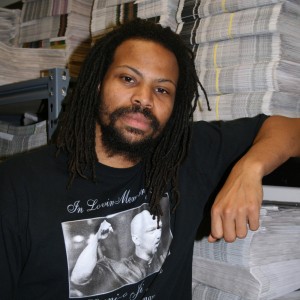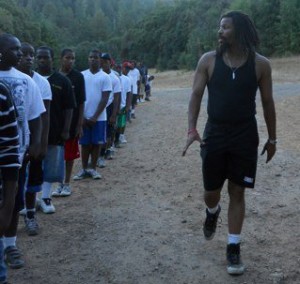The AP-Google Journalism and Technology Scholarship Program fosters new journalism skills in undergraduate and graduate students developing projects at the intersection of journalism and technology. Reginald James is one of six inaugural Scholars.

Current location: Dar es Salaam, Tanzania
Current gig: Travel Correspondent, Reach the World
Six-word memoir: Have Pen, Paper, Pictures — Will Travel.
Quick and dirty resume: Producer and host of The Black Hour internet radio show. Co-founded Harambee News, a publication for California Community College students. Former Editor-in-Chief of the Laney Tower at Laney College. Contributing editor to Oakland Local, and photojournalist for the Oakland Post and San Francisco Bay View. Awarded Chauncey Bailey Scholarship in 2010 by Bay Area Black Journalist Association.
Favorite fictional character: Taste-T from the film, “Fear of a Black Hat.”
Why did you choose to get involved with online media?
Initially, online media was the only form of media I had access to that could reach a wide range of people. I started off blogging on Myspace. I later started a blog and website for a publication I co-founded. Using online media eliminated the costs of paper and circulation, and the time consuming process of layout. After watching and participating in the aftermath of the murder of Oscar Grant, I realized the potential of online media, especially for students and independent journalists, was huge.
What happens during your average day?
Sometimes I wish I could have an average day, but that would mean living an average life. As an international student, my schedule varies day to day. I wake up early for prayer. I work out. I check Facebook to catch up on news – although East Africa Time is 10 hours ahead of California’s. Twice a week, I take two buses to my internship teaching English at a Primary School. I usually buy a newspaper from a vendor on my way. I have two classes with over 100 students in each. Afterward, I return to the university for class or to study. On the other days, I have classes for most of the day. I spend my evenings studying and speaking with people I’ve met. I also use the evenings to edit and organize photos taken in the field.
Your application stated you built strong online communities in an isolated and segregated digital world. What do you think are some of the reasons for this digital divide?
The Internet reminds me of the cafeteria at my high school: people of different cliques stick together. There were the athletes, band and theater kids, different racial groups, and so forth. One reason for this divide is that people have different interests, and based on those interests, they seek out different information and perspectives. Also, due to the loss of local and beat reporting, people crave information on certain topics, like education or their local neighborhood. This has led to a rise in blogging, citizen journalism and hyperlocal journalism. It is great that people can find information they are interested in; however, this tends to segregate the web. Now, people flock to sources of information that confirm their viewpoints and are not challenged.

Why do you think hyperlocal news sites continue to grow?
As long as people want news that affects them locally, and hyperlocal websites can localize national stories, these sites will grow. That is, if they have a business model.
Your project — proposing a hyperlocal news site for the University of Berkeley campus — was based on your study of how black students on campus consumed media. What did your study conclude?
African American UC Berkeley students are active, socially conscious and interested in news. They have access to portable computers, the Internet and Internet-ready smartphones. They rely on online videos, blogs and news websites, instead of print, radio and even television for their news, and word-of-mouth through informal peer networks is also important. Social media plays a big role in students’ lives, and many check social networking sites multiple times daily. Thus, I recommended that a website be created to fulfill students’ information needs. The website must be mobile-friendly and include culturally relevant content that highlights students at the university.
How has your experience as a graduate of community colleges shaped your path to digital journalism?
The community colleges introduced me to people from all parts of society and our global village. I had the opportunity to study journalism in class and practice on my campus and in the community. That practical experience, combined with further training from the Journalism Association of Community Colleges, emphasized the necessity of being able to tell stories across multiple forms of media.
If you had a million dollars dedicated to improving media, you would …
I’d set aside part of the funds to give loans to news entrepreneurs, train community members in media skills like news writing and photography, and I’d set up academies in high schools teaching both technological and media skills to youth.
